De Hongaarse dichter en schrijver Miklós Radnóti werd geboren op 5 mei 1909 in Boedapest. Zie ook alle tags voor Miklós Radnóti op dit blog.
Portrait
I’m nearly twenty-two years old. Thus
Christ too might have appeared in the autumn
at the same age when he
still had no beard, he was blond and maidens
dreamt of him nightly!
The Bull
Hitherto, I lived the throbbing life of a youthful bull
bored in the noonday heat among pregnant cows in the field,
running around in unending circles declaring his powers
and waving amid his game a foaming flag of saliva.
He shakes his head and turns with the splitting, thick air on his horns
and behind his stamping hooves the tormented grass and earth
spatters widely about the terrified green pasture.
And still I live like a bull, but a bull that suddenly stops
in the heart of the meadow singing with crickets, stops nostrils lifted
and sniffing the air. For he senses that far in the mountain forests
the roebuck too stops and listens and lightly flees with the wind,
the hissing wind that carries the stench of a distant wolf pack —
thus the bull snorts, but he will not escape like the deer
and considers that when his time is to come, he will fight and fall
and his bones will be scattered about in the district by the horde —
and slowly and sadly the bull bellows through the fat air.
Thus I will struggle and thus I will fall when the hour is come,
and the district will treasure my bones for reminders to future ages
Vertaald door Thomas Land
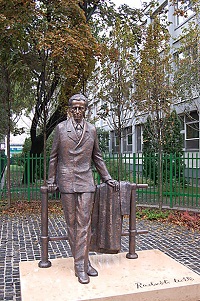
Miklós Radnóti (5 mei 1909 – 9 november 1944)
Standbeeld in Boedapest
De Turkse schrijver, dichter, vertaler en journalist Roni Margulies werd geboren op 5 mei 1955 in Istanbul. Zie ook alle tags voor Roni Margulies op dit blog.
De Maashaven
Mijn kamer bevindt zich op de elfde verdieping.
Als ik vanaf mijn balkon naar beneden kijk,
loopt er tussen oude platanen door,
op enorme betonnen benen,
een bovengrondse metro.
Gewoonlijk stapt er niemand in of uit,
of misschien een man of vijf, meer niet.
Tegenover me verheft zich een reusachtige schoorsteen;
beroet, beschimmeld, of hij ook rookt is nog de vraag.
Daarnaast, aan deze kant van de haven,
staat een silo van ik weet niet hoeveel ton.
Duidelijk al tientallen jaren niet in gebruik,
leeg. Omdat afbreken veel duurder moet zijn,
is hij niet gesloopt, maar blijven staan.
De haven wordt gevormd door een lange en rechthoekige
watervlakte, waarvan het ene eind op zee uitkomt.
Achter dikke rijen hijskranen gaat ’s avonds
de zon onder. Aan de andere kant van de rechthoek
met uitzicht op de wal,
kijk ik iedere avond vanaf mijn balkon of deze keer
de zon in de hijskranen zal blijven hangen.
Voor mij uit aan de verste kant van het water
ligt een groot schip met meerdere verdiepingen,
glanzend wit voor anker.
Tussen loodsen en metalen constructies door
kan ik het net zien. Maar als ’s morgens
de zon opkomt en het schip als eerste beschijnt
straalt het als een nieuwe dag. Als een belofte.
Als een sensatie. Als een verwachting.
Ik zal er morgenochtend eens heengaan.
Vertaald door Sytske Sötemann
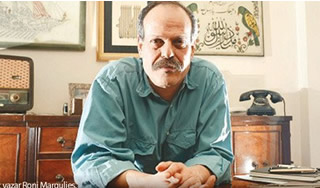
Roni Margulies (Istanbul, 5 mei 1955)
De Nederlandse dichteres Petra Else Jekel werd in Arnhem geboren op 5 mei 1980. Zie ook alle tags voor Petra Else Jekel op dit blog.
waar ik ter wereld kom staat een geboorteboom.
de zomereik waar ik op lijk staat solitair in
natte weidegrond met heuphoog gras dat altijd
bloeit. zijn wortels zijn als bank gegroeid
voor wie ruggensteun zoekt. ik neem hem mee
om hem te laten zien dat dit ben ik en hij neemt
plaats op schoot. ik zeg tegen de boom dit is
hem dan die ik verstoot om vrouw te zijn en om
dat ik verstikt van heimwee buiten de gewijde
grond verblijf. maar als ik zijn stuifmeel snuif,
weet ik weer waar te gaan om buiten adem onder
die lage kronkelige tak te staan die om mij heen.
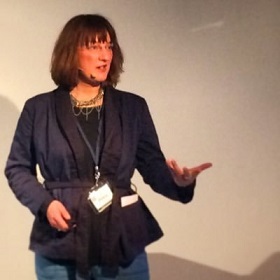
Petra Else Jekel (Arnhem, 5 mei 1980)
De Amerikaanse schrijver Morton Rhue (pseudoniem van Todd Strasser) werd geboren op 5 mei 1950 in New York. Zie ook alle tags voor Morton Rhue op dit blog.
Uit: Fame Junkies (Vertaald door Katarina Ganslandt)
„Stell dir vor, du wärst berühmt.
Was siehst du vor dir? Dein Foto bei tmz.com, Perez Hilton oder anderen Promiwebseiten im Netz? Dein Gesicht auf den Titelblättern von Hochglanzmagazinen? Eine schwarze Stretchlimousine, die langsam herangleitet und vor einer Meute kreischender Fans anhält? Ein wie ein warmer Frühlingsregen auf dich niederprasselndes Blitzlichtgewitter? Hände, die dir Fotos und Papierfetzen entgegenstrecken, damit du dich darauf verewigst? Einenroten Teppich, über den du schreitest? VIP-Bereiche, zu denen du plötzlich Zugang hast? Die offenen Arme, mit denen die Welt dich empfängt? Bewunderung, Neid?
Alle träumen von dir, wollen nur dich.
Dich dich dich.
Natürlich weißt du, dass diese Vorstellung nichts weiter als eine Illusion ist. Eine zarte Rosenblüte, die dich mit ihrem Duft verzaubert. Ohja, du weißt genau, was es bedeutet, berühmt zu sein, weil du Zeitschriften liest, fernsiehst und im Internet surfst. Dabei lassen sie dich nur die Rosenblüte sehen – nicht das große Ganze. Den mit spitzen Dornen besetzten Strauch, an dem die Blüte wächst, die sich windenden, alles erstickenden Ranken und die gierig um sich greifenden Wurzeln – all das zeigen sie dir nicht.
Aber womöglich gehörst du ja zu denen, die es gar nicht so genau wissen wollen, die es vorziehen, in der Illusion zu leben. Für mich bitte nur die Blüte, danke.“
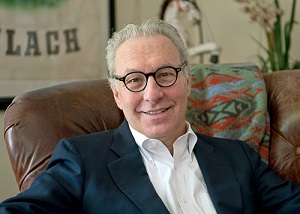
Morton Rhue / Todd Strasser (New York, 5 mei 1950)
De Amerikaanse dichter, schrijver en journalist Christopher Morley werd geboren op 5 mei1890 in Haverford, Pennsylvania. Zie ook alle tags voor Christopher Morley op dit blog.
Inscription For A Grammar
There were two cheerful pronouns
And nought did them disturb:
Until they met, out walking.
A conjugative verb.
The pronouns, child, were You and I,
We might as well confess;
But, ah, the mischief-making verb
I leave to you to guess!
Burning Leaves, November
These are the folios of April,
All the library of spring,
Missals gilt and rubricated
With the frost’s illumining.
Ruthless, we destroy these treasures,
Set the torch with hand profane-
Gone, like Alexandrian vellums,
Like the books of burnt Louvain!
Yet these classics are immortal:
O collectors, have no fear,
For the publisher will issue
New editions every year.
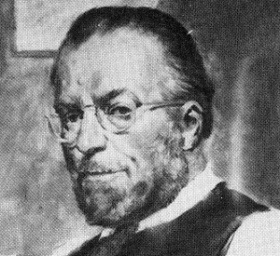
Christopher Morley (5 mei 1890 – 28 maart 1957)
De Franse dichter, schilder en criticus George Albert Aurier werd geboren op 5 mei 1865 in Châteauroux. Zie ook alle tags voor George Albert Aurier op dit blog.
Uit: Les Isolés, Vincent van Gogh
“Sous des ciels, tantôt taillés dans l’éblouissement des saphirs ou des turquoises, tantôt pétris de je ne sais quels soufres infernaux, chauds, délétères et aveuglants ; sous des ciels pareils à des coulées de métaux et de cristaux en fusion, où, parfois, s’étalent, irradiés, de torrides disques solaires ; sous l’incessant et formidable ruissellement de toutes les lumières possibles ; dans des atmosphères lourdes, flambantes, cuisantes, qui semblent s’exhaler de fantastiques fournaises où se volatiliseraient des ors et des diamants et des gemmes singulières — c’est l’étalement inquiétant, troubleur, d’une étrange nature, à la fois vraiment vraie et quasiment supranaturelle, d’une nature excessive où tout, êtres et choses, ombres et lumières, formes et couleurs, se cabre, se dresse en une volonté rageuse de hurler son essentielle et propre chanson, sur le timbre le plus intense, le plus farouchement suraigu ; ce sont des arbres, tordus ainsi que des géants en bataille, proclamant du geste de leurs noueux bras qui menacent et du tragique envolement de leurs vertes crinières, leur puissance indomptable, l’orgueil de leur musculature, leur sève chaude comme du sang, leur éternel défi à l’ouragan, à la foudre, à la nature méchante ; ce sont des cyprès dressant leurs cauchemardantes silhouettes de flammes, qui seraient noires ; des montagnes arquant des dos de mammouths ou de rhinocéros ; des vergers blancs et roses et blonds, comme d’idéaux rêves de vierges ; des maisons accroupies, se contorsionnant passionnément ainsi que des êtres qui jouissent, qui souffrent, qui pensent ; des pierres, des terrains, des broussailles, des gazons, des jardins, des rivières qu’on dirait sculptés en d’inconnus minéraux, polis, miroitants, irisés, féeriques ; ce sont de flamboyants paysages qui paraissent l’ébullition de multicolores émaux dans quelque diabolique creuset d’alchimiste, des frondaisons qu’on dirait de bronze antique, de cuivre neuf, de verre filé ; des parterres de fleurs qui sont moins des fleurs que de richissimes joailleries faites de rubis, d’agates, d’onyx, d’émeraudes, de corindons, de chrysobérils, d’améthistes et de calcédoines ; c’est l’universelle et folle et aveuglante coruscation des choses ; c’est la matière, c’est la nature tout entière tordue frénétiquement, paroxysée, montée aux combles de l’exacerbation ; c’est la forme devenant le cauchemar, la couleur devenant flammes, laves et pierreries, la lumière se faisant incendie, la vie, fièvre chaude »
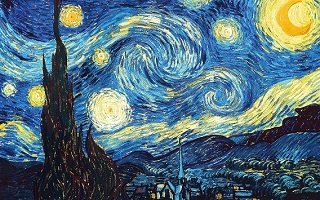
George Albert Aurier (5 mei 1865 – 5 oktober 1892)
Vincent van Gogh, De Sterrennacht uit 1889
De Poolse schrijver en journalist Henryk Sienkiewicz werd geboren in Wola Okrzejska op 5 mei 1846. Zie ook alle tags voor Henryk Sienkiewicz op dit blog.
Uit: Quo vadis? (Vertaald door Jeremiah Curtin)
“But after a certain time he spoke, and opened his eyes; he inquired about the weather, and then about gems which the jeweller Idomeneus had promised to send him for examination that day. It appeared that the weather was beautiful, with a light breeze from the Alban hills, and that the gems had not been brought. Petronius closed his eyes again, and had given command to bear him to the tepidarium, when from behind the curtain the nomenclator looked in, announcing that young Marcus Vinicius, recently returned from Asia Minor, had come to visit him. Petronius ordered to admit the guest to the tepidarium, to which he was borne himself. Vinicius was the son of his oldest sister, who years before had married Marcus Vinicius, a man of consular dignity from the time of Tiberius. The young man was serving then under Corbulo against the Parthians, and at the close of the war had returned to the city. Petronius had for him a certain weakness bordering on attachment, for Marcus was beautiful and athletic, a young man who knew how to preserve a certain aesthetic measure in his profligacy; this, Petronius prized above everything. “A greeting to Petronius,” said the young man, entering the tepidarium with a springy step. “May all the gods grant thee success, but especially Asklepios and Kypris, for under their double protection nothing evil can meet one.” “I greet thee in Rome, and may thy rest be sweet after war,” replied Petronius, extending his hand from between the folds of soft karbas stuff in which he was wrapped. “What’s to be heard in Armenia; or since thou wert in Asia, didst thou not stumble into Bithynia?” Petronius on a time had been proconsul in Bithynia, and, what is more, he had governed with energy and justice. This was a marvellous contrast in the character of a man noted for effeminacy and love of luxury; hence he was fond of mentioning those times, as they were a proof of what he had been, and of what he might have become had it pleased him. “I happened to visit Heraklea,” answered Vinicius. “Corbulo sent me there with an order to assemble reinforcements.”
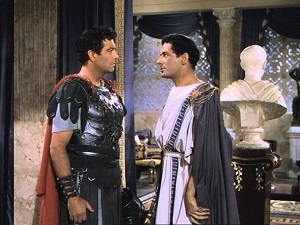
Henryk Sienkiewicz (5 mei 1846 – 15 november 1916)
Robert Taylor (Marcus Vinicius) en Leo Glenn (Petronius) in de film “Quo vadis?” uit 1951
Zie voor nog meer schrijvers van de 5e mei ook mijn blog van 5 mei 2013 deel 2.
